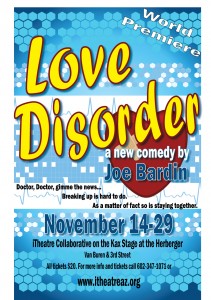The threat of a staged reading
There is nothing like the “threat” of a staged reading for a new play, to clarify the mind, and show me that the play’s not quite ready. Brenda Jean Foley was kind of enough to consider my new play for the Mesa Encore Theatre’s Second Sunday Play Reading series. Fortunately, she was busy preparing for her lead role in Carousel, now at the Mesa Arts Center, and various other involvements, including motherhood, to read the play right away.
I went from waiting impatiently for her response, what was taking so long? To reflecting on the play, to realizing that in fact, there was more work to be done.
I find there’s really no substitute for the passage of time and fresh eyes and ears, for clarifying scene, theme and character. It could be a night, it could be a week, it could be a month or more.
My instincts are good, but I don’t always have the patience to follow my instincts. My gut told me that structurally the play wasn’t quite there. I didn’t know the answer, I just knew an answer was wanting. The good news is I’ve come to my senses in time to take the play back, and that Brenda had not read it through yet.
It’s not that a play has to be perfect for a staged reading – the staged reading might very well reveal more improvements. But even a staged reading is an audition of sorts, and it’s never a good idea to approach an audition unprepared.

